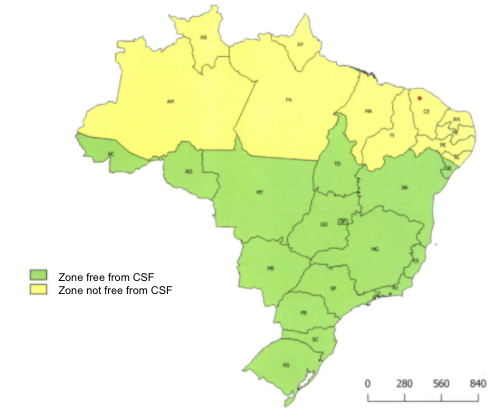Brazilian second-largest pork producing State is certified as an independent zone free from classical swine fever
Paraná State received a technical seal from the World Organization for Animal Health (OIE) as an independent zone free from Classical Swine Fever (CSF) on March 10th last week. The OIE had already recognized Paraná State as a unified zone free comprising fourteen Brazilian states from the CSF in 2016. The recognition as an independent zone will isolate Paraná from the other states, and it will not be affected by possible maladies occurrences in other regions. Also, the independence is expected to be advantageous to the state producers as they will be able to securely guarantee the safety of their herds to the international market.
Paraná is the second-largest pork producer in Brazil, producing 936,270 MT in 2020. The production forecast for 2021 is to slaughter the equivalent of 950 thousand MT. With the new independent technical seal, the state aims to expand towards the international market fiercely. It also targets to surpass Santa Catarina State and become the largest pork producer in Brazil within three years. The export volume is also expected to almost double from the current 107,000 MT to 200,000 MT in this period as producers will be able to offer their product to countries with strict sanitary requirements such as Japan, Mexico, and South Korea.
Classical Swine Fever
The OIE lists the CSF as a viral and highly contagious disease in pigs, which should be immediately notified when detected. Although It is only transmissible to pigs and not a threat to humans, the virus is very crucial as it can survive in the environment, in the infected carcass, even when frozen. Humans can also carry the virus in clothing, shoes, and vehicles, so the containment measures are very strict. The CSF causes circulatory problems, skin lesions, conjunctivitis, high-fever, neurological problems in piglets, paralysis followed by death. The disease can wipe out herds and cause considerable loss to farmers.
Brazilian States free from Classical Swine Fever

Paraná, one year without foot-to-mouth disease in without vaccination
Paraná State has also been free from the foot-to-mouth disease without vaccination for a year and is close to being awarded international recognition from the OIE as an illness-free zone. The last case of the foot-to-mouth disease in the State was registered in 2006, with a cow that showed light symptoms after participating in an agricultural fair.
Foot-to-mouth disease is also a highly transmissible bovine disease that was successfully irradicated with vaccines over five decades. The vaccination program against the foot-to-mouth disease in Paraná started in 1968, and in the last campaign of 2019, 97% of the cattle in the State were vaccinated. The State government keeps 33 control barriers between State borders, and the Federal government controls the national borders between Argentina and Paraguay to maintain sanitary security against the disease. As the disease can only be transmitted to healthy animals through direct contact with the sick animals, it is crucial to control the border to minimize the sanitation issue
The technical seal from the OIE is expected to be awarded in May, and producers are very excited as they will be able to offer their products to more countries. With the two technical seals from the OIE, Paraná state is expected to increase its international participation as a strong meat supplier on an international scale.
Sources:
- AFISA-PR. Translated from Portuguese. "OIE reports CSF in Ceara".
- Folha de Londrina. Translated from Portuguese. "Para receives the technical seal from the OIE as a zone free from the CSF".
- IBGE. Livestock slaughter volume.
- Globo. Translated from Portuguese. "Parana celebrates a year free from the foot-to-mouth disease without vaccination".
- Parana Gov. Translated from Portuguese. "State is awarded the technical seal of a zone free from the CSF".
- Suino Cultura Industrial. Translated from Portuguese. "Parana is a zone free from the CSF".